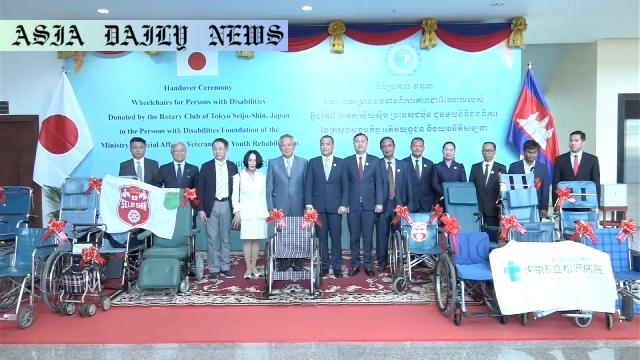Wheelchairs donated by a charity group in Tokyo have been handed over in Phnom Penh to aid disabled Cambodians, including landmine survivors.
- Wheelchairs donated by Japan to aid disabled Cambodians.
- Focus on rehabilitation support for landmine survivors.
- Highlights Japan’s continued commitment to peace and support for Cambodia.

Introduction: A Meaningful Contribution
In a heartwarming gesture of international solidarity, a Tokyo-based charity group, Rotary Club of Tokyo Seijo-Shin, has donated over 30 refurbished wheelchairs to a rehabilitation facility in Phnom Penh, Cambodia. These wheelchairs, formerly used in a Tokyo metropolitan hospital, have been repaired and repurposed to assist disabled individuals, including survivors of Cambodia’s devastating history of landmine incidents, as well as those unable to afford the critical mobility aid.
The Handing Over Event
The handover ceremony, held in Phnom Penh, saw the presence of notable attendees including Japan’s Ambassador to Cambodia, Ueno Atsushi, and a member of the Cambodian Cabinet. In this symbolic event, the renovated wheelchairs were officially presented to the rehabilitation facility as part of a broader effort to improve the quality of life for Cambodians with disabilities. The event underscored shared gratitude, with Cambodian ministers applauding Japan’s support, and Rotary Club representatives expressing hope for the devices to unlock new opportunities for recipients.
Cambodia’s Ongoing Struggles
Cambodia remains a country battling the aftermath of its tumultuous past. Decades of civil war have left the landscape filled with dormant landmines, which continue to harm unsuspecting residents. The handicapped community in Cambodia is further challenged by economic hardships, preventing many from accessing vital equipment such as wheelchairs. This donation, therefore, not only serves to meet an immediate physical need but also addresses a broader issue of accessibility and dignity for marginalized people in Cambodia.
Japan’s Role in Rebuilding Cambodia
Japan has been a long-term supporter of Cambodia since the end of its civil war. From fostering peace agreements to establishing economic collaborations, Japan has played a crucial role in aiding Cambodia’s recovery. The latest donation of refurbished wheelchairs is a testament to Japan’s ongoing commitment to the Southeast Asian nation. Ambassador Ueno reiterated Japan’s dedication to meaningful contributions that uplift and empower Cambodian citizens.
The Drive for Inclusive Development
This act of goodwill reflects a broader global call for inclusive development, highlighting the significance of providing mobility and accessibility to people with disabilities. Such initiatives, while largely symbolic, also indicate the potential for lasting partnerships in addressing some of the world’s most pressing challenges. Cambodia’s rehabilitation centers, bolstered by such supports, now hold greater promise for aiding individuals with severe mobility issues, ensuring a semblance of independence and an improved quality of life.
Conclusion
The story of Japan’s charitable donation to Cambodia is not just about wheelchairs; it is about empowerment, compassion, and the fostering of diplomatic relations rooted in humanity. For the recipients of these wheelchairs, this is more than just mobility – it is an opportunity to rebuild their lives, despite the physical and economic barriers that many have faced.



Commentary
Humanitarian Efforts that Inspire
Reading about Japan’s donation of refurbished wheelchairs to Cambodia is a reminder of the profound impact of humanitarian aid that bridges borders and cultures. This initiative demonstrates how thoughtful acts of kindness can address practical problems while also building bonds between nations.
The Importance of Mobility
For people living with disabilities, mobility is a basic yet life-changing need. These wheelchairs will not only provide physical mobility but also restore autonomy to individuals, allowing them a chance to interact more fully with society. In countries like Cambodia, where resources for disability support are limited, such donations are even more critical.
Global Collaboration for Change
Beyond the immediate benefits, this act highlights the power of international collaboration. Japan’s efforts in Cambodia represent a model for how nations can work together to solve issues stemming from historical conflicts, such as the lingering threat of landmines. It also serves as a reminder of the ongoing challenges faced by landmine survivors and the global responsibility to support affected communities.
Japan’s continuing commitment to Cambodia’s development – whether through economic aid, peacebuilding, or charitable contributions – is a testament to the strong relationship between the two nations. Acts like these inspire hope and underscore the importance of global solidarity in addressing shared challenges.